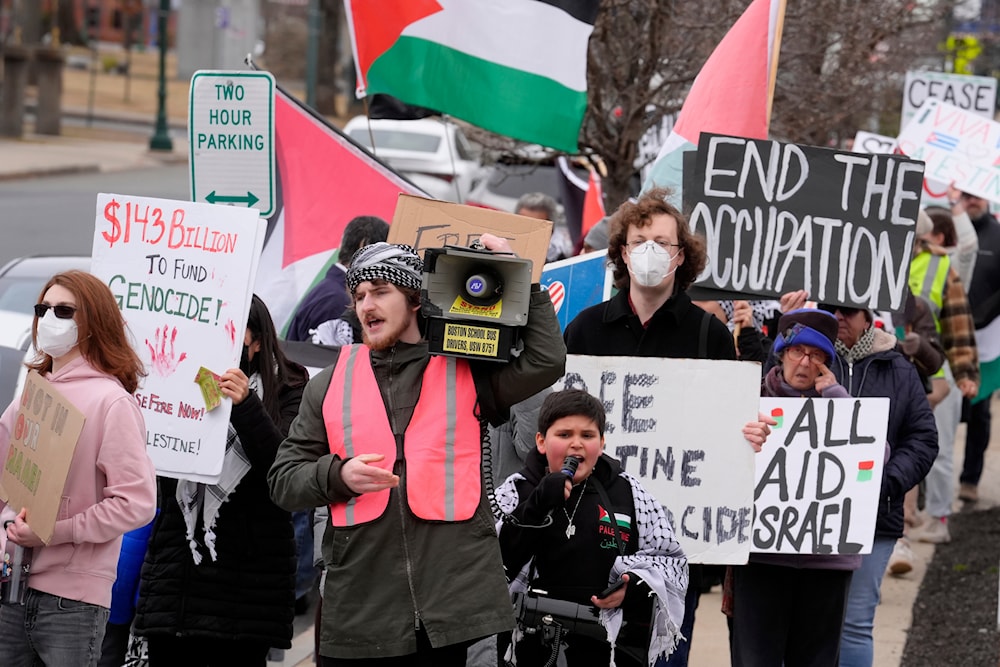Local media across US refuse to cover ceasefire protests: Truthout
Even when coverage is reported, it often boasts support for “Israel”.
-

Pro-Palestinian demonstrators display signs while marching during a protest held to call for a ceasefire in the war on Gaza, Sunday, Feb. 11, 2024, in Braintree, Massachusetts. (AP)
It has been an ongoing challenge for small cities and counties in the US to get coverage of pro-Palestine protests supporting a ceasefire when it occurs outside of state capitals - and even when coverage is reported, it often boasts support for “Israel”.
Truthout said that last month, NJ11 for Palestine held a vigil in Livingston, New Jersey, for the loss of Palestinian lives by "Israel". That same day, hundreds of Zionists yelled over them and called a 7-year-old girl a “future generation’s terrorist” as she read the names of dead Palestinians. Organizers also claimed that they spit on a Palestinian serving as a safety marshal while he was walking alone.
None of this was mentioned in the local pieces written by reporters, and neither was the vigil.
Immy Moustafa, an NJ11 organizer, told Truthout, “With the vigil, we were right across the street from each other,” adding, “You can’t claim you didn’t know. You can’t claim you didn’t see. There’s no reason other than an intentional deleting of what the full story is.”
Ali Aljarrah, one of the founders of NJ11 for Palestine, clarified that ignoring the ongoing activism is actively contributing to the increasing violence against Palestinians.
“There’s this constant erasure of Palestinian history,” Aljarrah said.
“So, when we’re talking about local media and its impact on Falasteen, that’s one thing to keep in mind. If local media’s not being honest in showing an event and demonstrations that are happening in support of Palestine … then it’s really showing that they’re complicit in this genocide and the erasure of Palestinians here in America”, he noted.
Read more: How language used in US media facilitates genocide
Corporate intrusion
Earlier this month, Ceasefire Now NJ, a coalition of organizations, got Union City to pass a ceasefire resolution but still did not make it to The Jersey Journal.
Even in Minneapolis, Adnan Ahmed wrote an op-ed to grow support, saying, “I wrote it like I’m just gonna send it to some of the mainstream news outlets because they’re for Minnesota readers. So I purposely watered it down.”
Researchers at the Medill School of Journalism, Media, Integrated Marketing Communications at Northwestern University revealed that over half of all counties have limited or restricted access to local news outlets, which is due to buyouts from corporate and often right-wing investors.
Truthout also highlighted that if coverage of these small protests does occur, the media coverage and local pieces written are mostly biased and do not include sufficient (or correct) context.
The New York Times, Washington Post, and Los Angeles Times were found to have a consistent bias against Palestinians in their coverage of "Israel's" aggression on #Gaza, according to an Intercept analysis.#GazaGenocide #Palestine pic.twitter.com/mkTcQYPxaZ
— Al Mayadeen English (@MayadeenEnglish) January 11, 2024
Meera Jaffrey, an organizer with Jewish Voice for Peace (JVP) North Jersey, said, “The media bias definitely has an impact on the movement and people’s perception of the truth”.
She added, “Not only does this type of reporting thwart the ceasefire effort, its main intention, but it also helps to propagate anti-Arab, anti-Palestinian and Islamophobic sentiment. Mainstream media is making activists in the ceasefire movement have to work harder for peace.”
The same goes for Chattanooga, Tennessee, as activist Kaitlin Blanchard stated, “Centering Hamas as the reason for Israeli aggression is the biggest trope,” telling Truthout, “It is present in every single article.”
Don't mix this with that
Wassim Hage, an organizer with the Arab Resource and Organizing Center (AROC) in the San Francisco Bay Area, said, “In San Francisco, I think it would be like 800 to 1,200 public comments in person in support of a ceasefire resolution versus one public comment in opposition … [but it’s covered] as if they’re equal in terms of the political weight that they have.”
Hage, Blanchard, and other New Jersey activists underlined that Zionists were being merged with “the Jewish community," although anti-Zionist Jews have played a prominent role in the ceasefire movement resulting in the arrest of many in certain instances.
“AROC will always get the quote because we are the Arab center locally, but we’ve found that reporters are sometimes more reticent to quote anti-Zionist Jewish organizations,” Hage noted.
Liz Cooper, another JVP North Jersey organizer, wrote for a blog established by Ceasefire Now NJ concerning a weekly protest constantly being held in South Orange, New Jersey.
“I was really motivated to try to speak on it because I felt like it was an important change in the political landscape of North Jersey that has not been reported on particularly thoroughly,” she said.
Cooper stated that Ceasefire Now NJ created their own blog to make sure that action gets the correct coverage and that the correct message goes out.
“The media is part of the problem,” Hage believes. “The movement in general is starting to come around to the notion that we need to take media, whether it’s social media or popular media or press media, seriously, and kind of struggle on that terrain.”
Read more: Hamas, PFLP decry decision to limit Muslims in al-Aqsa during Ramadan
“On a much smaller scale, it’s the same thing that is happening in Gaza,” Moustafa said. “It is up to the average person to become a journalist and to show what is happening.… That’s kind of the coverage that we as pro-Palestinians are relying on because we’re not getting much coverage otherwise.”

 5 Min Read
5 Min Read








